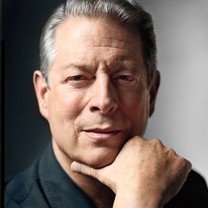We never intended to cause all this destruction, just as Alfred Nobel never intended that dynamite be used for waging war. He had hoped his invention would promote human progress. We shared that same worthy goal when we began burning massive quantities of coal, then oil and methane.
Even in Nobel’s time, there were a few warnings of the likely consequences. One of the very first winners of the Prize in chemistry worried that, “We are evaporating our coal mines into the air.” After performing 10,000 equations by hand, Svante Arrhenius calculated that the earth’s average temperature would increase by many degrees if we doubled the amount of CO2 in the atmosphere.
Seventy years later, my teacher, Roger Revelle, and his colleague, Dave Keeling, began to precisely document the increasing CO2 levels day by day.
But unlike most other forms of pollution, CO2 is invisible, tasteless, and odorless — which has helped keep the truth about what it is doing to our climate out of sight and out of mind. Moreover, the catastrophe now threatening us is unprecedented — and we often confuse the unprecedented with the improbable.
We also find it hard to imagine making the massive changes that are now necessary to solve the crisis. And when large truths are genuinely inconvenient, whole societies can, at least for a time, ignore them. Yet as George Orwell reminds us: “Sooner or later a false belief bumps up against solid reality, usually on a battlefield.”
In the years since this prize was first awarded, the entire relationship between humankind and the earth has been radically transformed. And still, we have remained largely oblivious to the impact of our cumulative actions.
Indeed, without realizing it, we have begun to wage war on the earth itself. Now, we and the earth’s climate are locked in a relationship familiar to war planners: “Mutually assured destruction.”
More than two decades ago, scientists calculated that nuclear war could throw so much debris and smoke into the air that it would block life-giving sunlight from our atmosphere, causing a “nuclear winter.” Their eloquent warnings here in Oslo helped galvanize the world’s resolve to halt the nuclear arms race.
Now science is warning us that if we do not quickly reduce the global warming pollution that is trapping so much of the heat our planet normally radiates back out of the atmosphere, we are in danger of creating a permanent “carbon summer.”
As the American poet Robert Frost wrote, “Some say the world will end in fire; some say in ice.” Either, he notes, “would suffice.”
But neither need be our fate. It is time to make peace with the planet.
We must quickly mobilize our civilization with the urgency and resolve that has previously been seen only when nations mobilized for war. These prior struggles for survival were won when leaders found words at the 11th hour that released a mighty surge of courage, hope and readiness to sacrifice for a protracted and mortal challenge.
These were not comforting and misleading assurances that the threat was not real or imminent; that it would affect others but not ourselves; that ordinary life might be lived even in the presence of extraordinary threat; that Providence could be trusted to do for us what we would not do for ourselves.
No, these were calls to come to the defense of the common future. They were calls upon the courage, generosity and strength of entire peoples, citizens of every class and condition who were ready to stand against the threat once asked to do so. Our enemies in those times calculated that free people would not rise to the challenge; they were, of course, catastrophically wrong.
Now comes the threat of climate crisis — a threat that is real, rising, imminent, and universal. Once again, it is the 11th hour. The penalties for ignoring this challenge are immense and growing, and at some near point would be unsustainable and unrecoverable. For now we still have the power to choose our fate, and the remaining question is only this: Have we the will to act vigorously and in time, or will we remain imprisoned by a dangerous illusion?
Mahatma Gandhi awakened the largest democracy on earth and forged a shared resolve with what he called “Satyagraha” — or “truth force.”
(Note: You can view every article as one long page if you sign up as an Advocate Member, or higher).





